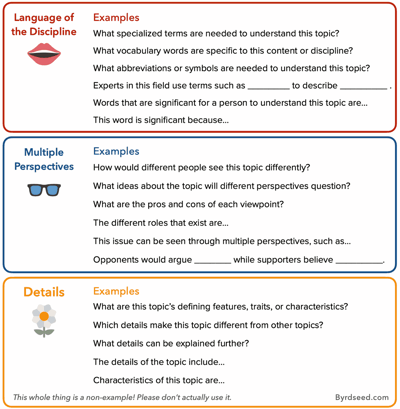As I’ve been working through bad examples of Depth and Complexity questions, I’ve honed in on a source of my misconceptions: Depth and Complexity introduction handouts.
Do a Google search for “depth and complexity charts” and you’ll see a bunch of examples. They are typically PDFs presented as a table. They show each Depth and Complexity icon, give a definition, and then offer sample questions or sentence starters.
But the questions are, well, quite bad! 😬 These introductions to Depth and Complexity led me down some not-so-great paths. But people keep handing them out and putting them on slides at conferences.
A Sample
Now, my goal is not to shame anyone (except myself!) so I’ve reworked and combined a few examples to discuss. Here’s a subset of a typical Depth and Complexity introduction PDF:

Take a moment and read through that ⬆️ What pops out to you? Then, continue on to see if we noticed the same things.
[Pause]
Problem 1: Low-Level, Listing Questions
The questions are low-level. I call them BOB (Bottom of Bloom’s). Many just ask students to make a list. For example:
👄 What abbreviations or symbols are needed to understand this topic?
Why would I ever ask students to list abbreviations? That’s not very deep! And here’s another listing example:
👓 This issue can be seen through multiple perspectives, such as ____.
So, I’d get a list of perspectives? What use is that? Now, that might set up a sequence of questions. But there is no sequence on this sheet. Just one-off questions. (That question is also so poorly written, but I’m getting ahead of myself!)
Last example:
🌼 Characteristics of this topic include: ___.
So, if we’re learning about mammals, my students would list: warm blooded, hairy, born live, etc. I certainly don’t need Depth and Complexity to ask for a list of characteristics of mammals! Teachers have been asking that question for decades. It’s neither deep nor complex.
Problem 2: Duplicate Questions
These one-sheets often have duplicated questions that are just slightly rephrased. It feels like the goal was “fill up all the space” rather than “share great examples.”
Two duplicates:
👄 What specialized terms are needed to understand this topic?
👄 What vocabulary words are specific to this content or discipline?
This is the same question!! Plus, it’s low-level. When would I ever want students to just list vocabulary words?
And both versions are written so poorly. Would you ever ask someone, “What specialized terms are needed to understand this topic?” It’s such an unnatural way of speaking, right?
Problem 3: Poorly Written
The questions sound like rough drafts. They’re wordy. They’re strangely complex. It seems like the author is trying to hit a particular word count rather than prompt a 3rd grader to think deeply!
I’d want to revise and edit these questions for clarity:
Original What are this topic’s defining features, traits, or characteristics?
My First Revision What are the defining characteristics?
My Second Revision Name the top 3, most essential characteristics.
The second revision is much clearer, right? More fun? I still don’t love it (I’ll get to why).
Gosh, I don’t even know how I’d revise this one:
👓 What ideas about the topic will different perspectives question?
The problem here isn’t just that the question is poorly written. It’s that the question isn’t about_ anything. Why not pick a real topic instead of use the phrase “the topic”. That brings us to…
Problem 4: Vagueness Disease
The questions are all sick with Vagueness Disease. I see this so often in Depth and Complexity examples. The person who wrote the questions didn’t want to tie the questions to an actual topic. So they wrote “the topic.” But you cannot write great questions if you don’t know the topic you’re asking about!
Even my second revision from above is unnatural because I’m not asking about a real topic. Let’s change that!
Original What are this topic’s defining features, traits, or characteristics?
Specific Topic What three characteristics make a dolphin truly a dolphin?
Ahh. That feels SO much better, right? I wrote more about Vagueness Disease here.
The King of All Problems
And that brings us to the biggest problem of all. I’d bet you good money that the person who typed the questions never used their questions in a classroom. It’s pretty obvious, honestly. Because no teacher would ever ask a student:
👓 How would different people see this topic differently?
That’s just not a real question. Likewise, I’d never say to my class:
🌼 What details can be explained further?
Every kid would just stare at me in confusion. Because the question doesn’t make a lick of sense!
So, when you’re out there learning about Depth and Complexity, make sure that the person you’re hearing from has actual classroom experience implementing Depth and Complexity I wrote more about that here.

